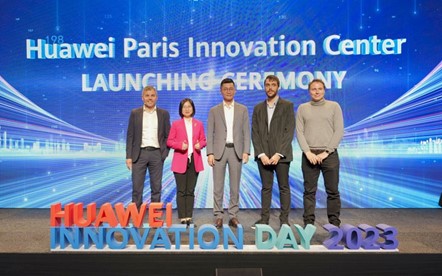Huawei backs SME digital transformation in Europe
If you help European SMEs go digital then you help power the European economy. This was the undisputed message at the recent two-day HUAWEI CONNECT 2023 event in Paris under the theme of “Accelerate Green & Digital Transition Together”. #Sponsored

If you help European SMEs go digital then you help power the European economy. This was the undisputed message at the recent two-day HUAWEI CONNECT 2023 event in Paris under the theme of “Accelerate Green & Digital Transition Together”.
Citing data compiled by the European Commission, Vicky Zhang, Vice President of Corporate Affairs at Huawei, noted that 99% of all businesses in the European Union are SMEs. They also account for nearly 65% of jobs in the region’s private sector and contribute more than 50% of Europe’s GDP.
“The link is clear,” said Zhang. “If you want the European economy to thrive, its millions of SMEs must thrive. Supporting SMEs, including startups, is supporting our future.”
Zhang was speaking at an afternoon session entitled “SME Innovation: Unlocking Europe’s Economic Future”, which brought together innovators, entrepreneurs and industry leaders. Common themes emerged from the various presentations and panel discussions, not least the need for more partnerships and ecosystem-building, greater sharing of ICT knowledge and resources on open platforms, the necessity of training programmes to help SME digital transformation, and much more effort to encourage female entrepreneurship.
There was also general agreement that making all this happen was a huge challenge. Dr Horst Heitz, Chair of the Steering Committee at SME Connect (SMEC), a Europe-wide network and communication platform aimed at helping its 1.5 million SME members grow through the exchange of ideas, noted the EC has set an ambitious target for all European SMEs to have basic digital knowledge and skills by 2035. Yet only 58% are currently equipped with that basic digital know-how.
“There’s a lack of knowledge and uncertainty,” said Dr Heitz. The damaging upshot, he noted, was only 0.7% of SMEs were going cross-border in Europe to make business, and just 0.5% were spreading their wings beyond the region. More encouragingly, he added that 72% of European SMEs were willing to go down the digital transformation path, but half said they didn’t know how to go about it.
“We’ve lots of excellent training programs offered by the EC and EU Member States, but SMEs are not aware of them,” continued Dr Heitz. “Large companies, like Huawei, is more successful compared to government programs because they have direct access to SMEs.”
Europe needs more digital upskilling
The importance of SME digital skills training was highlighted by Afke Schaart, SVP of Public Affairs at Huawei. “We really need to help accelerate and simplify the business for SMEs, which makes them grow and perhaps go global,” she said. “We offer not only mentoring and technological support but a one-stop solution and partnership.”
Schaart was referencing Huawei’s trio of OpenLabs in Europe: Berlin, Istanbul and Paris. Based on the ideas of openness, collaboration, and building digital ecosystems, the OpenLabs provide a testing ground for digital solutions. Huawei also has programmes in France, Italy, Poland and Ireland that are specifically tailored to help local startups.
“A lot of SMEs and their founders are still struggling [with digital transformation] although since the pandemic people have transformed a little more digitally,” added Schaart. “Although there’s been a bit of [digital] catch-up, there’s still much more to do. We have to work on the basics.”
Hrvoje Smolic, Founder and CEO of Graphite Note, an Ireland-based startup, vouched for the usefulness of Huawei’s mentoring at the Dublin OpenLabs. “Huawei really helped us,” said Smolic. “Through an intensive course we learned how to articulate clearly what we’re doing to potential customers and investors, which is especially important when you’re involved in deep tech.”
Graphite Note has developed a “no-code” software-as-a-service solution that allows businesses, without AI or ML expertise, to automatically transform their raw data into predictions and next-best-step strategies. Smolic ruefully acknowledged that non-tech people don’t necessarily appreciate the importance of F1 scores (a barometer of machine-learning model accuracy) being better than competitors.
Unveiling of the Paris Innovation Center
At the end of the SME “Innovation Day”, Kenneth Fredriksen, SVP of Huawei’s European region, took to the stage and announced the opening of the Paris Innovation Centre, which is available to both SMEs and large organizations. “The center continues what we have been doing for a long time already and that is to build a better ecosystem for SMEs and partners here in Europe,” said Fredriksen.
He described it as an “upgrading” of Huawei’s commitment to Fance and Europe, following on from the launch of Paris OpenLabs in 2018, as digitalization becomes more important. With a slated annual investment of €2 million, Fredriksen asserted that the center “will provide an innovative platform where SMEs and startups can come together for shared success”.
Focus areas of the Paris Innovation Center are knowledge sharing, joint innovation, as well as professional resources for integration & verification and go-to-market support.
“Huawei already supplies knowledge and materials for ICT skills online, but with the Paris Innovation Center we are taking it one step further,” said Fredriksen. “At the center we’ll be creating an interactive space where we bring together our top experts from different sectors to encourage more in-person exchanges so SMEs and partners can get the most from Huawei’s experience.”
Joint innovation will be helped by open platforms and the sharing of industry know-how. “We’ll also bring together test validation cases and experiences from Huawei from a wide product range covering 15 industries and 80 scenarios of professional testing,” said Fredriksen. SMEs, he said, will also get access to Huawei’s 5,000 sales channels in Europe. “We can act as a tool for SMEs to increase visibility and realise full potential.”
With the unveiling of the Paris Innovation Center, Zhang reaffirmed Huawei’s commitment to Europe where it has had a presence for more than 20 years.
“Huawei is glad to share its experience and knowledge in Europe,” she said. “Together we can improve business growth by building digital security, kickstarting energy efficiency and truly realizing business potential. It’s why we work together with partners and share our experience through teaching programs, startup competitions and incubators. We welcome the opportunity to work with European leaders from the public and private sectors to boost commercial business.”
About the Author(s)
You May Also Like













